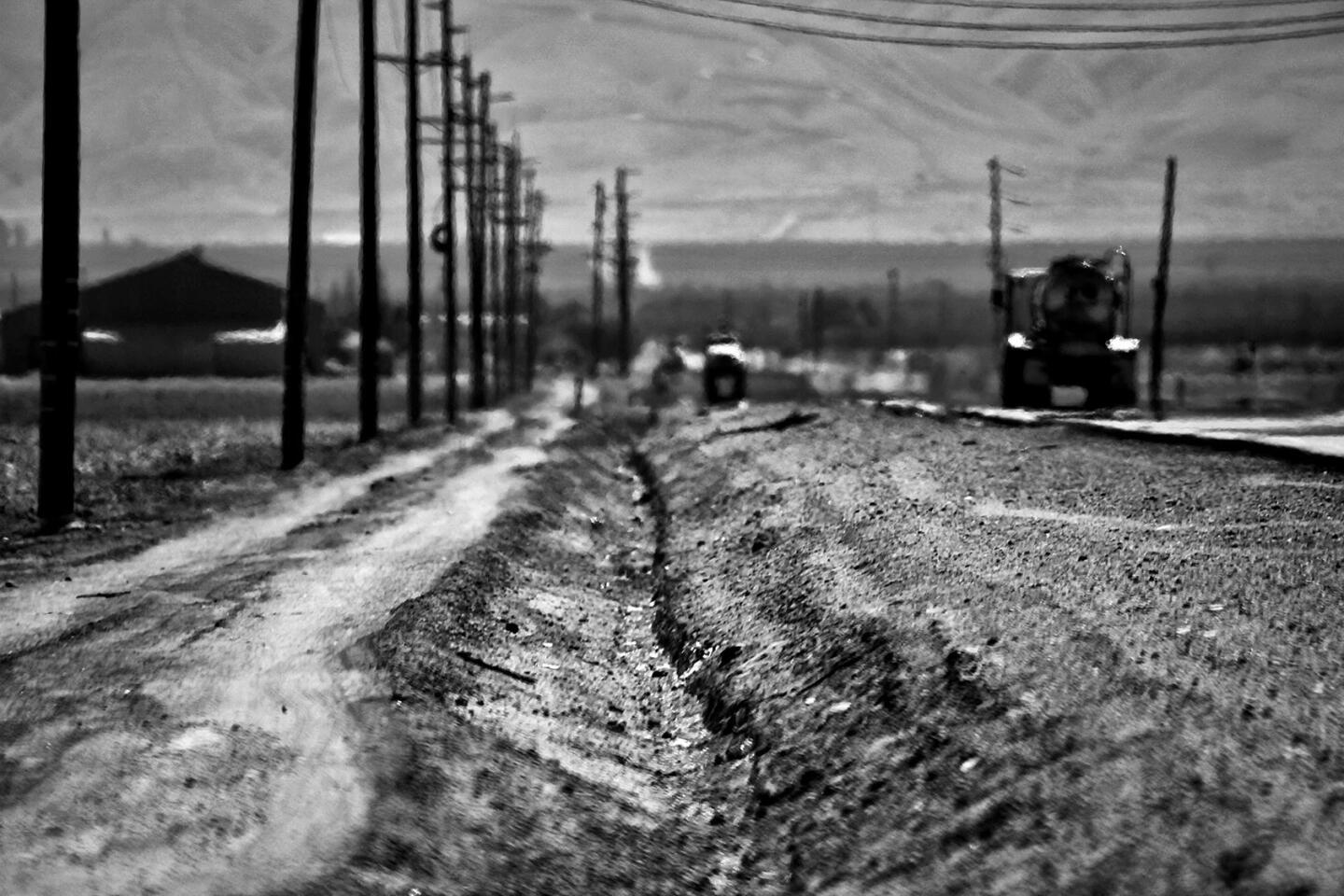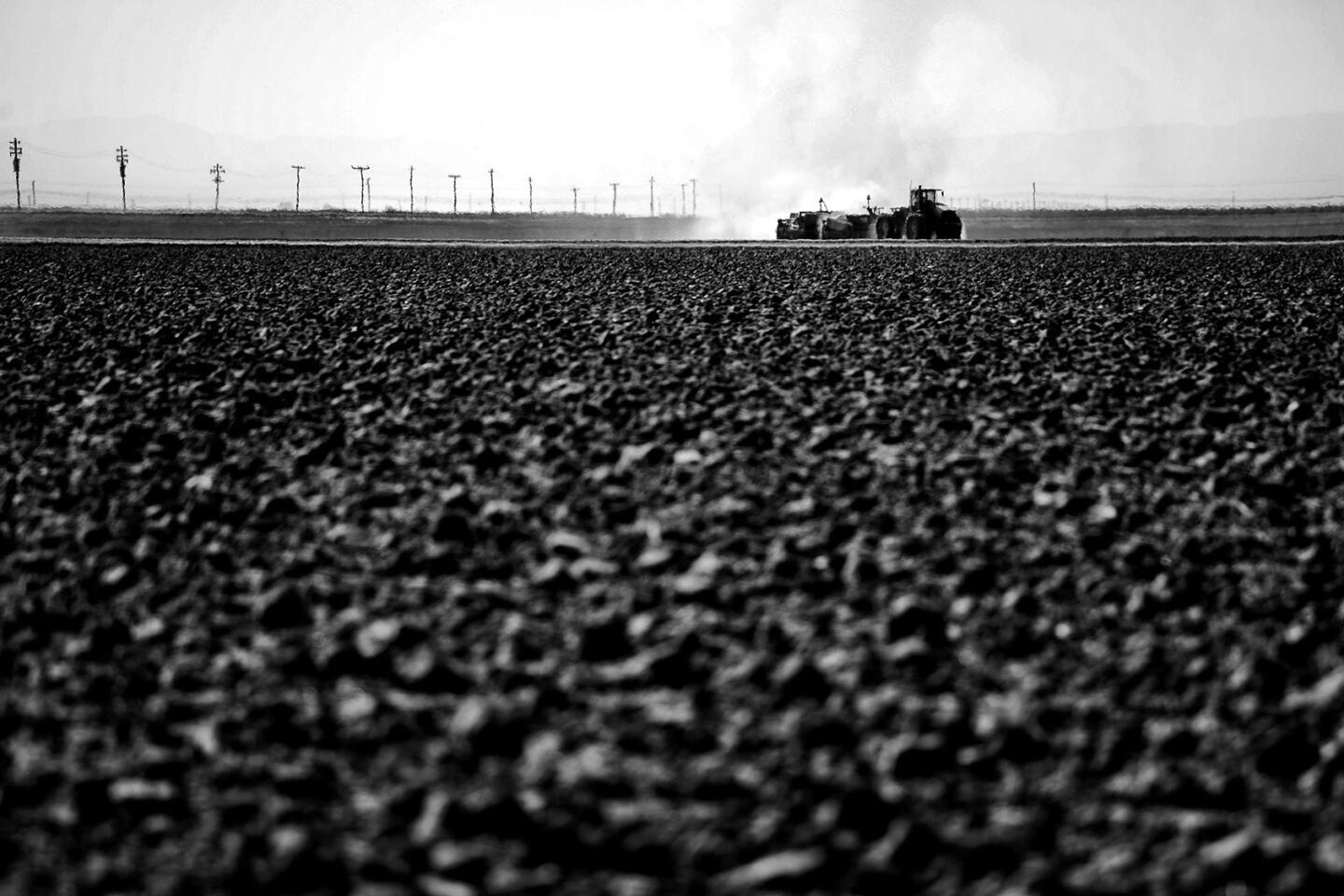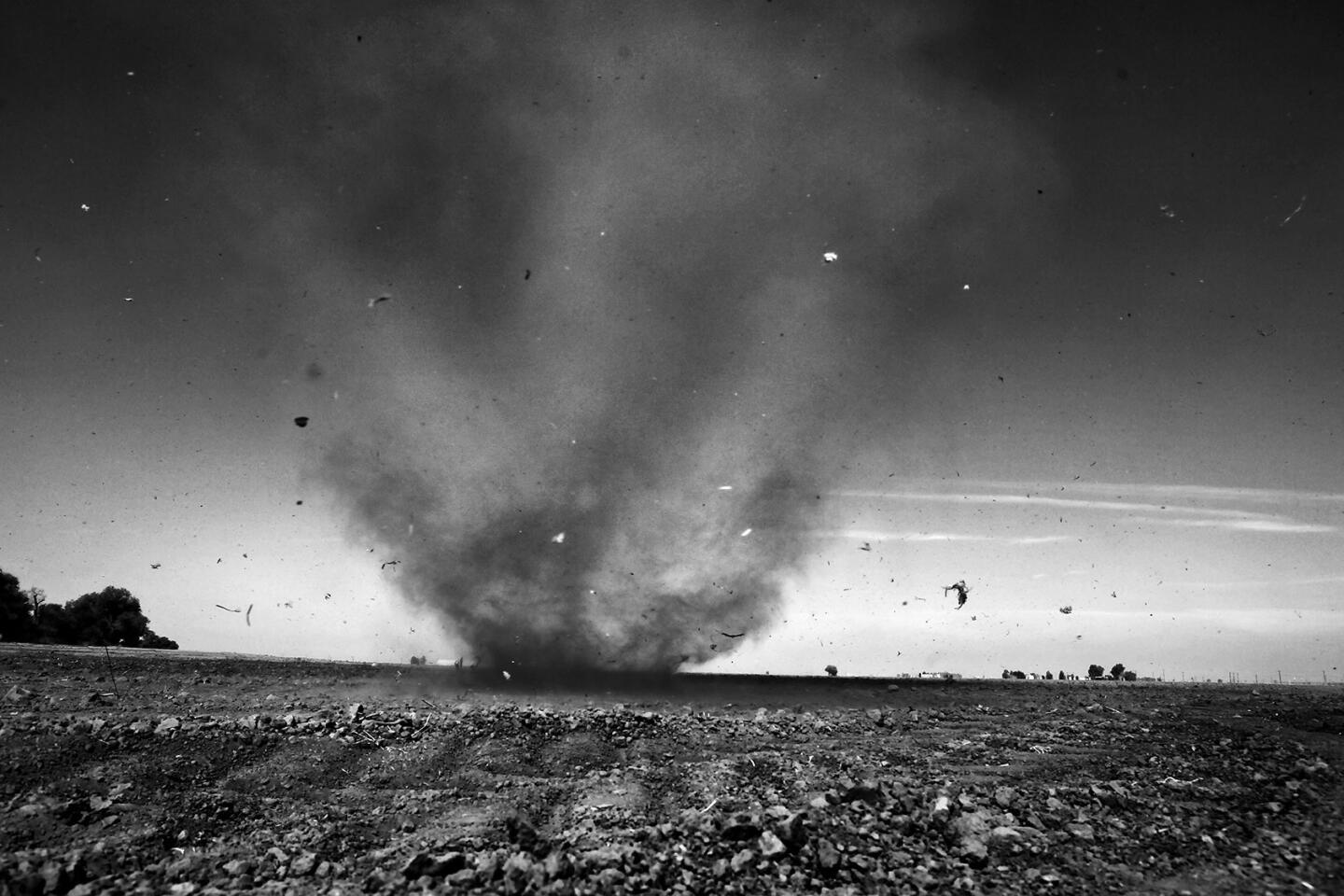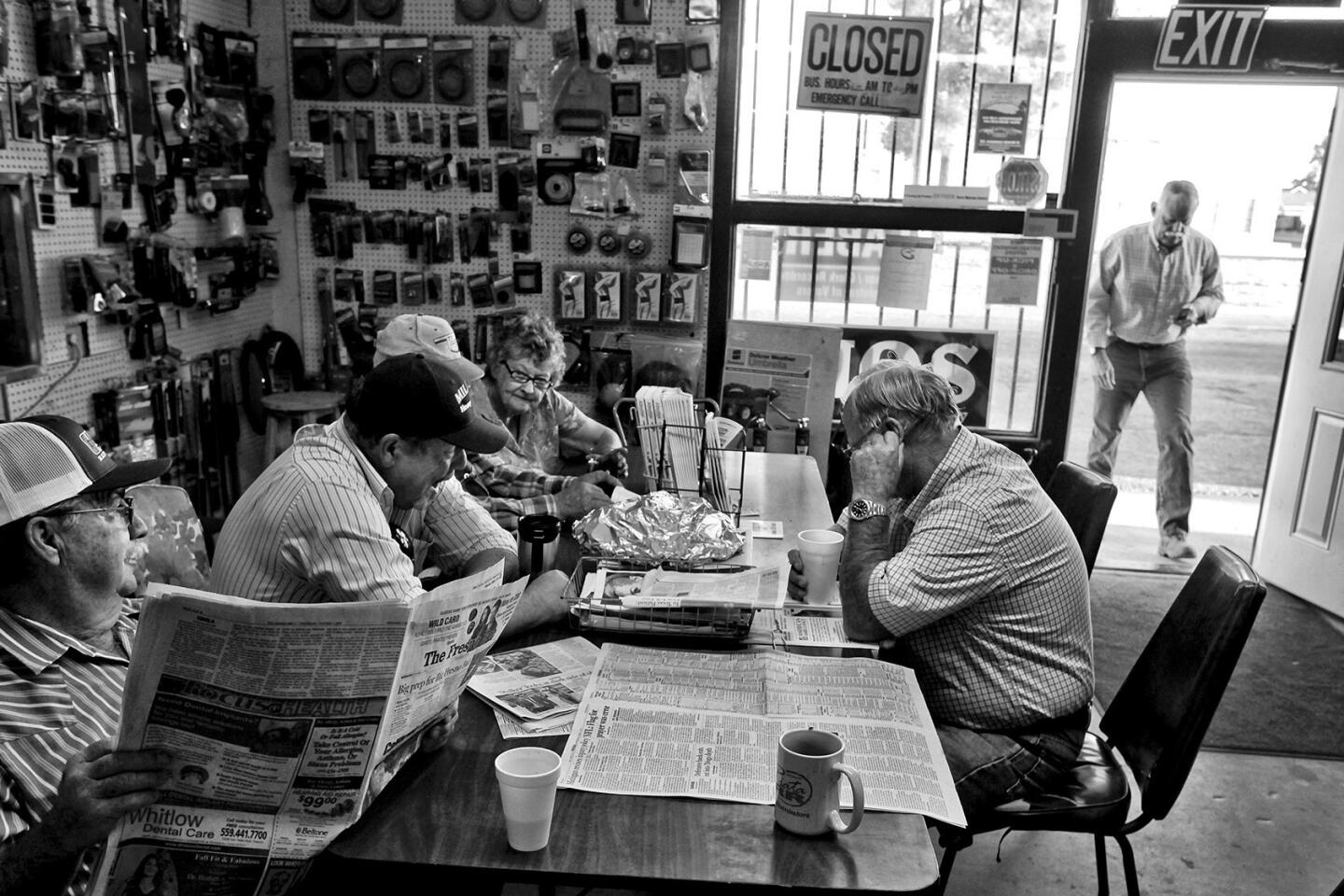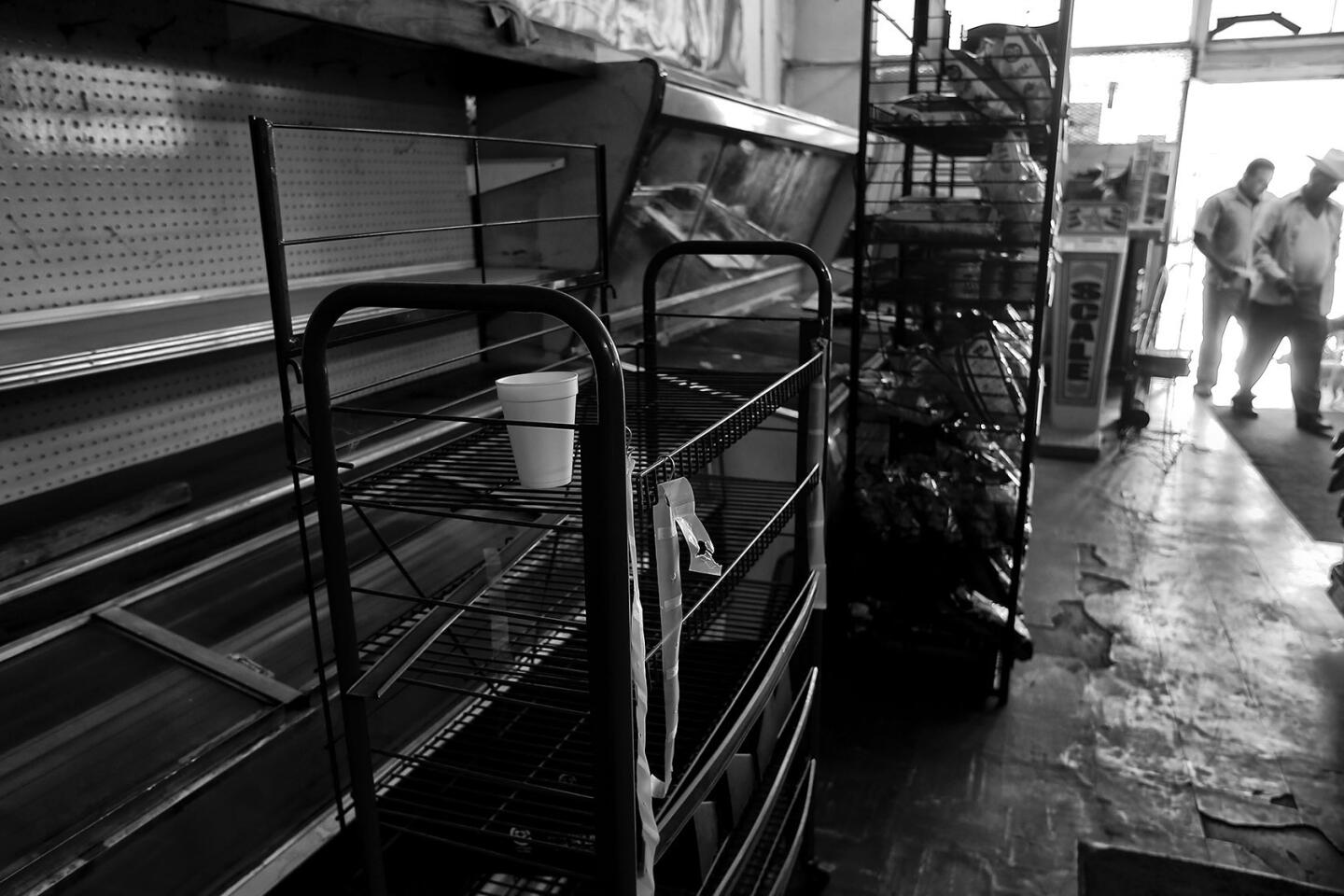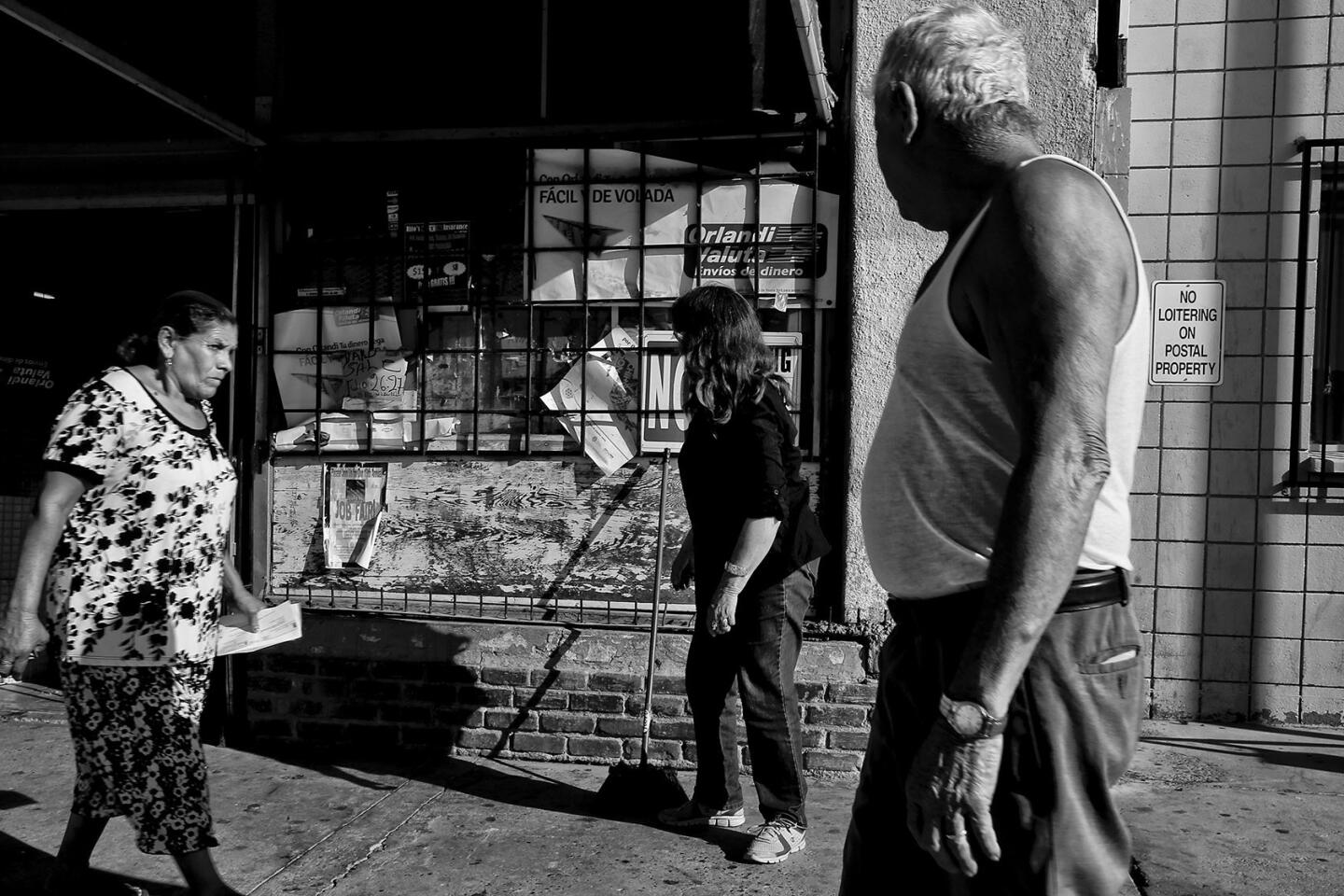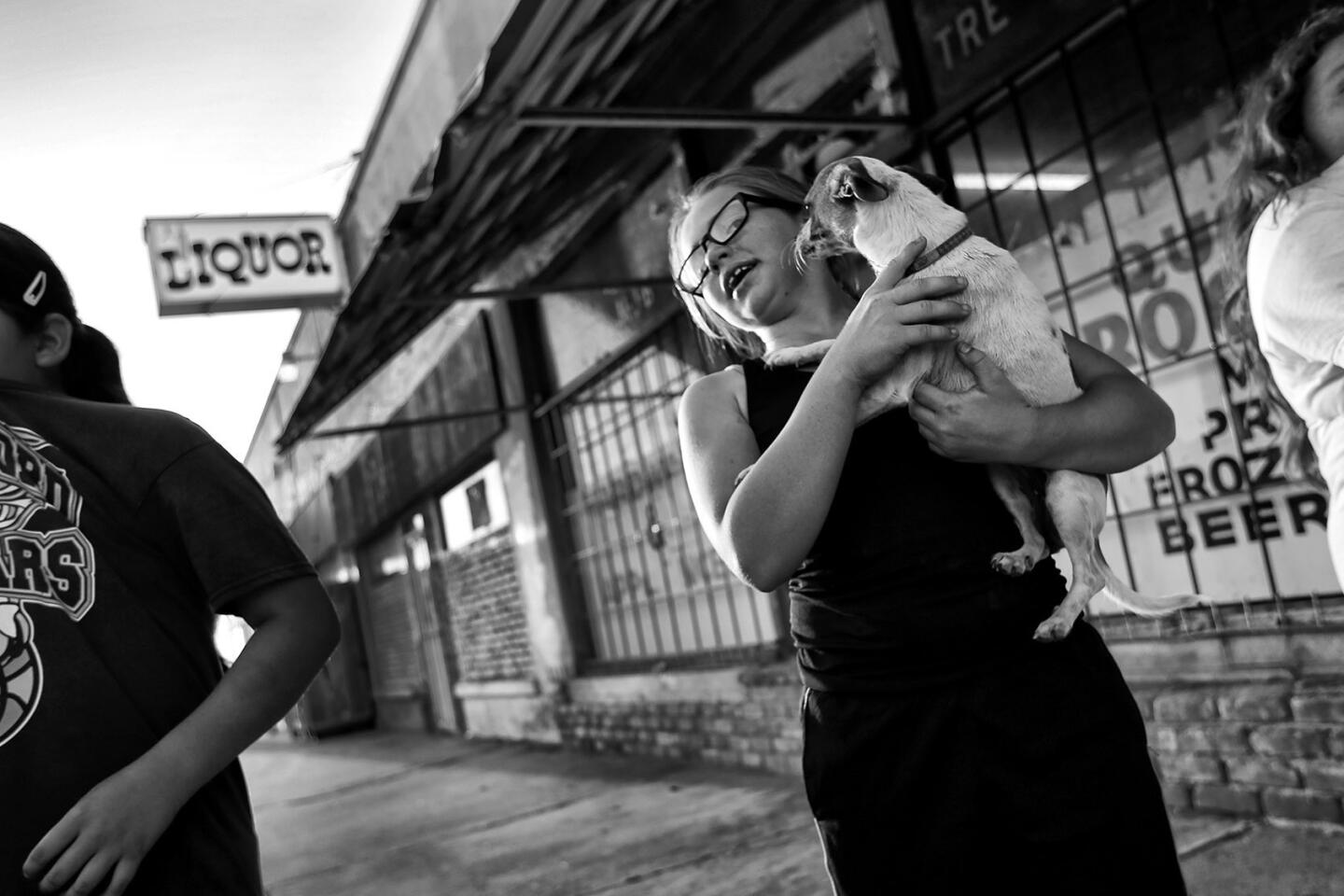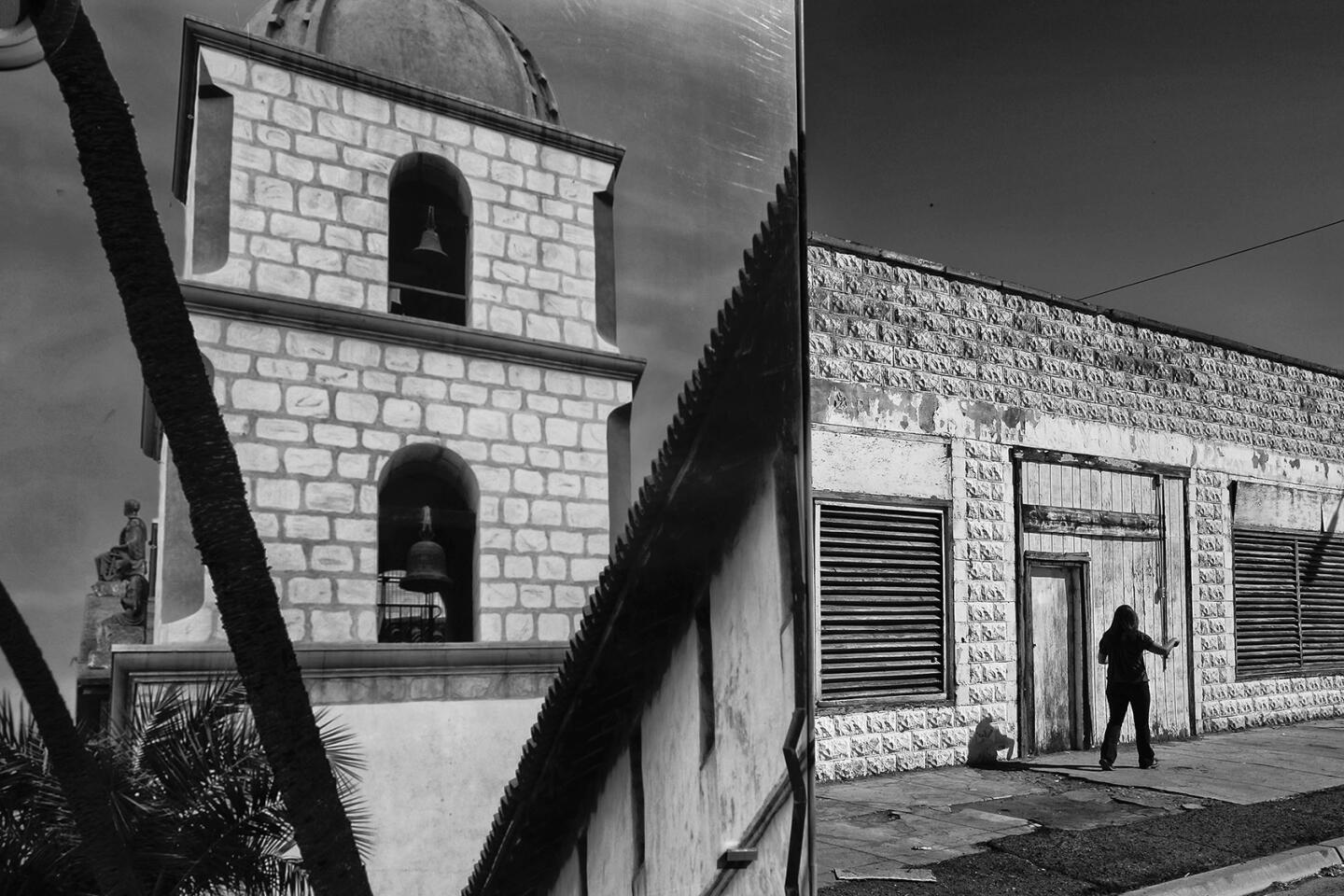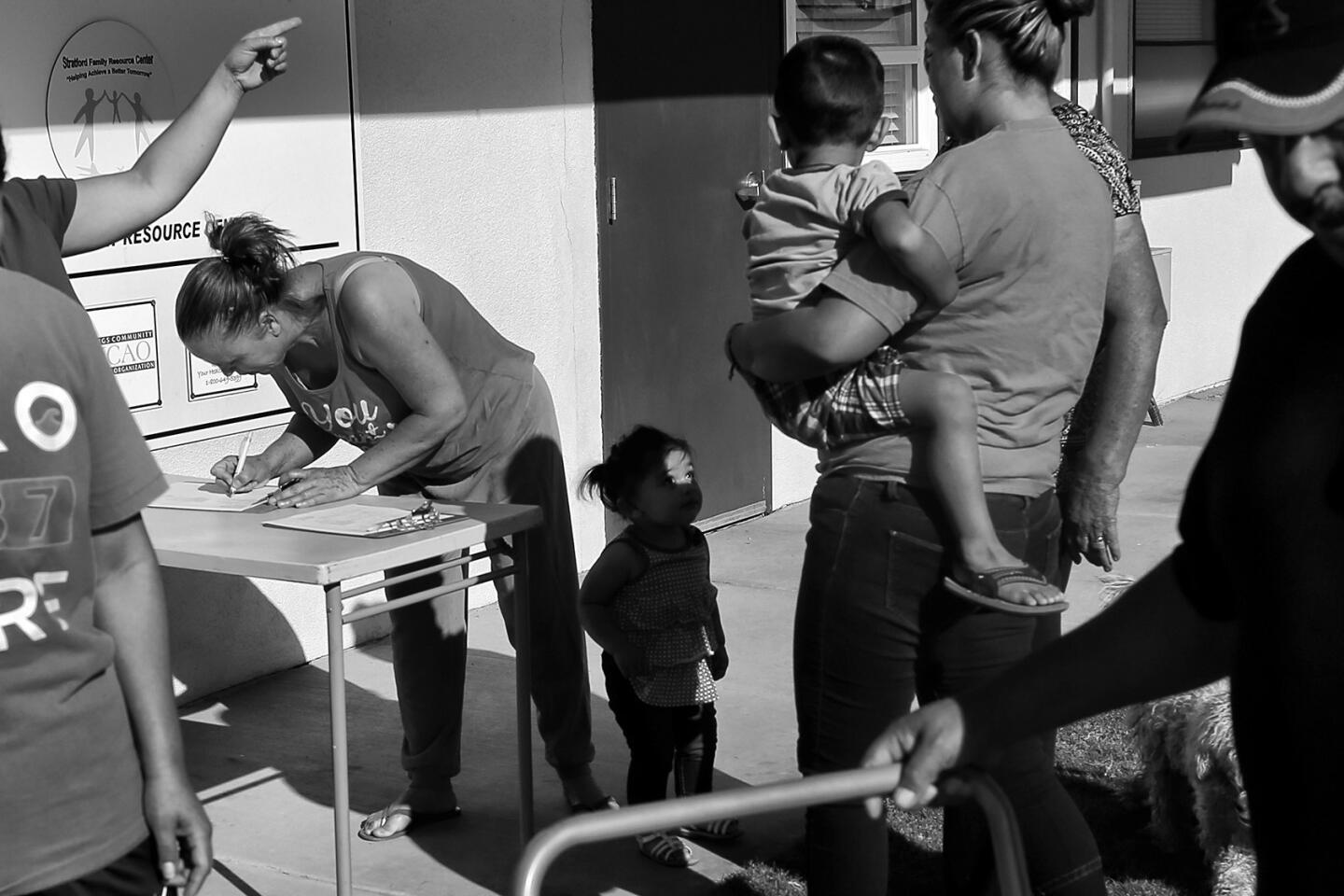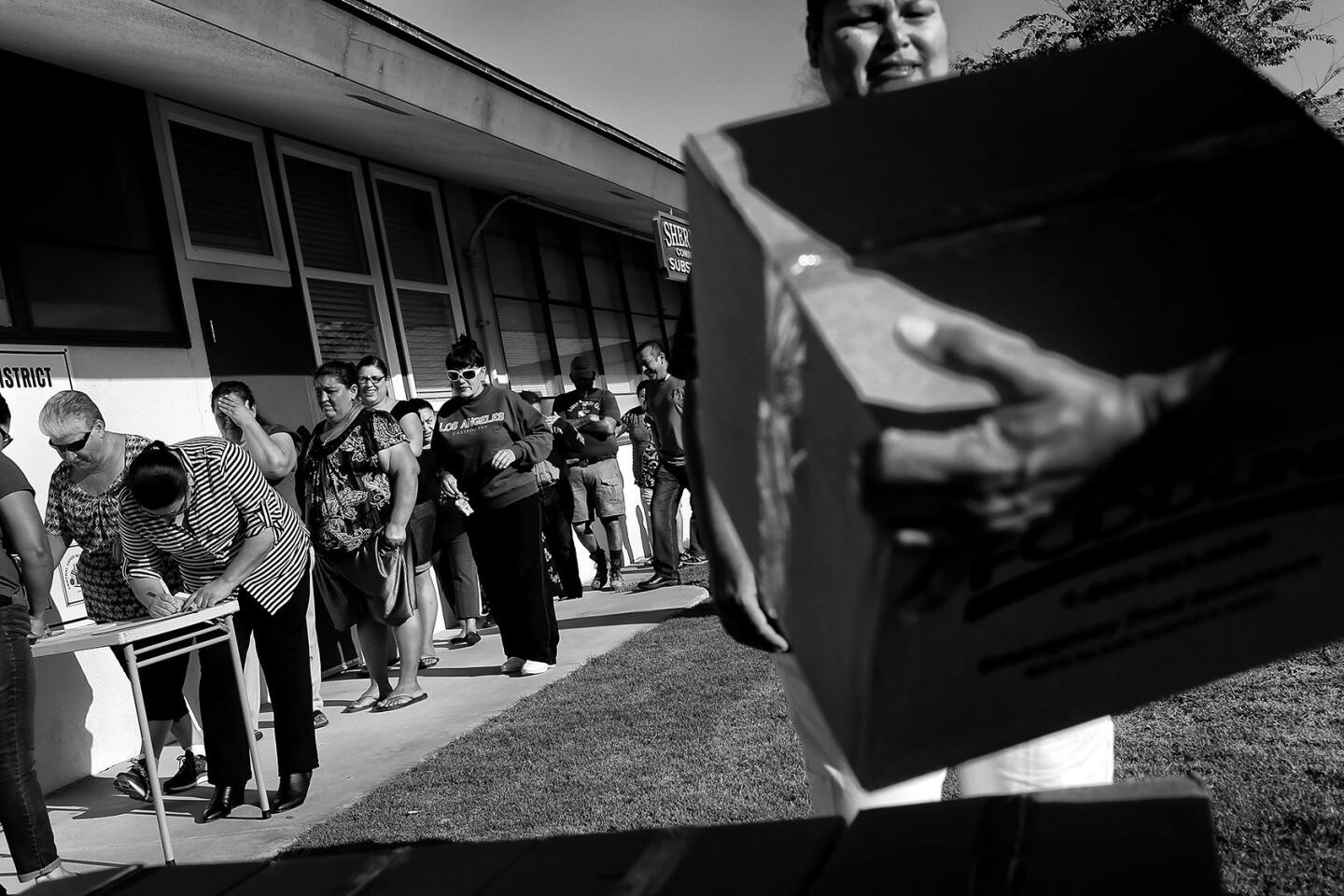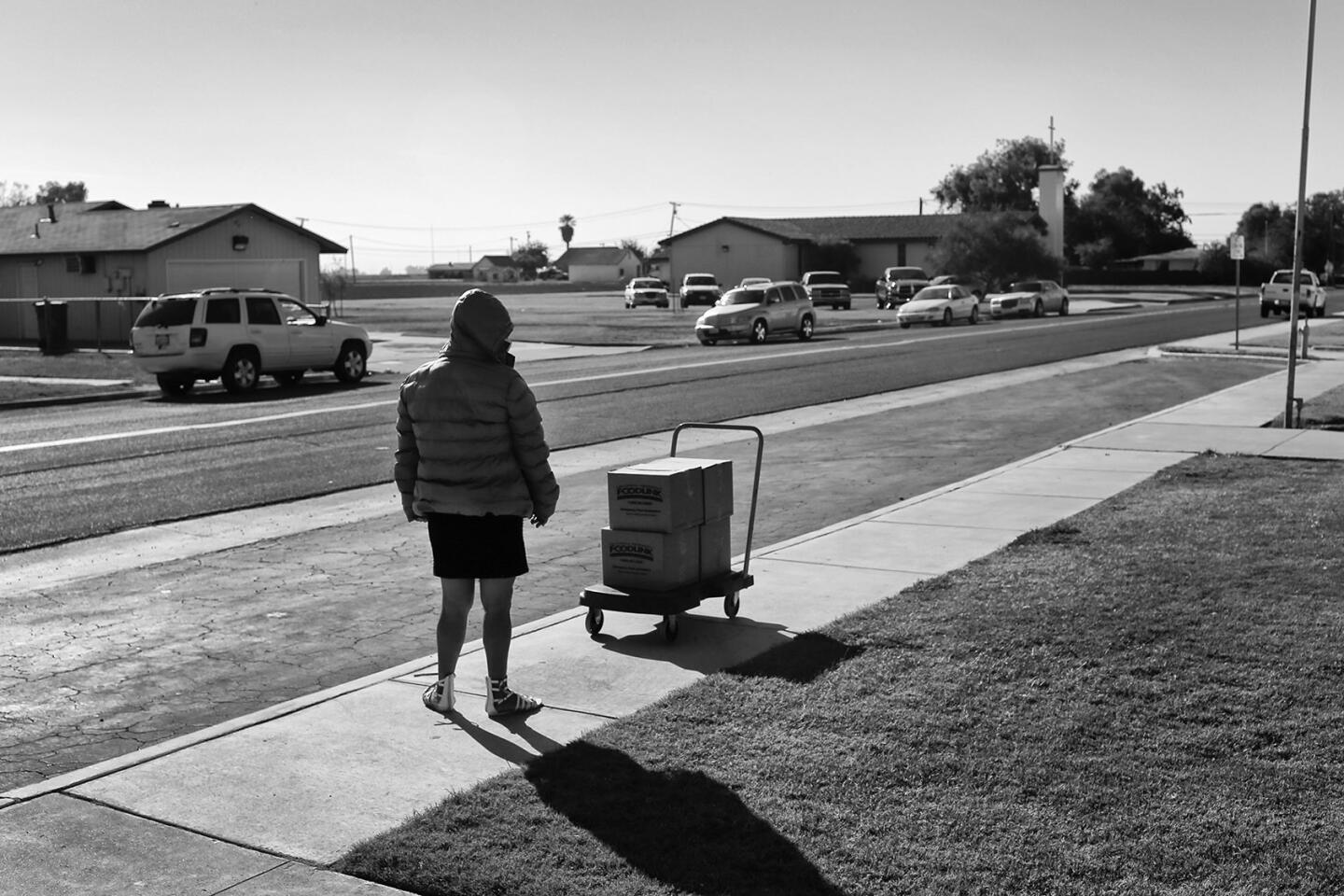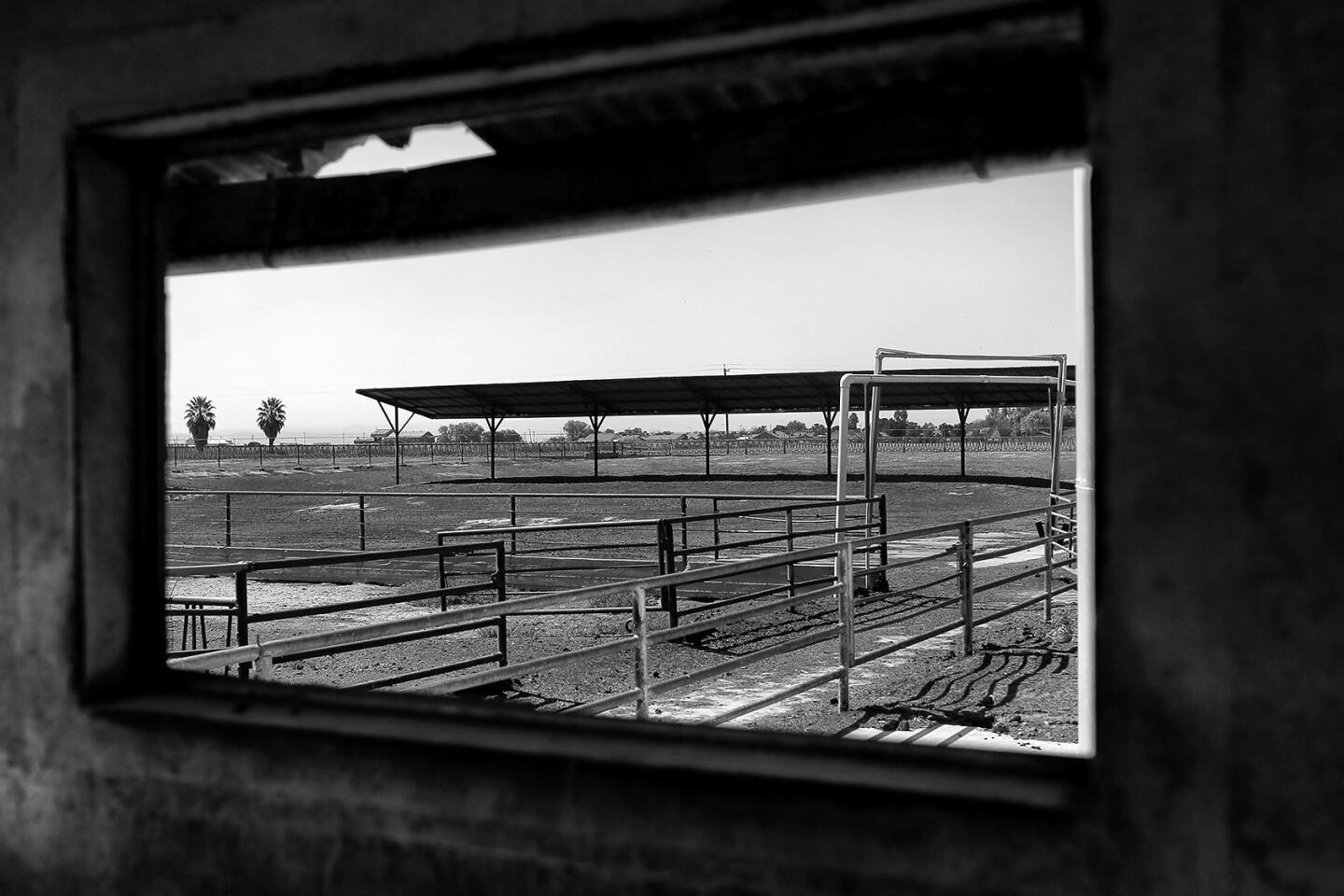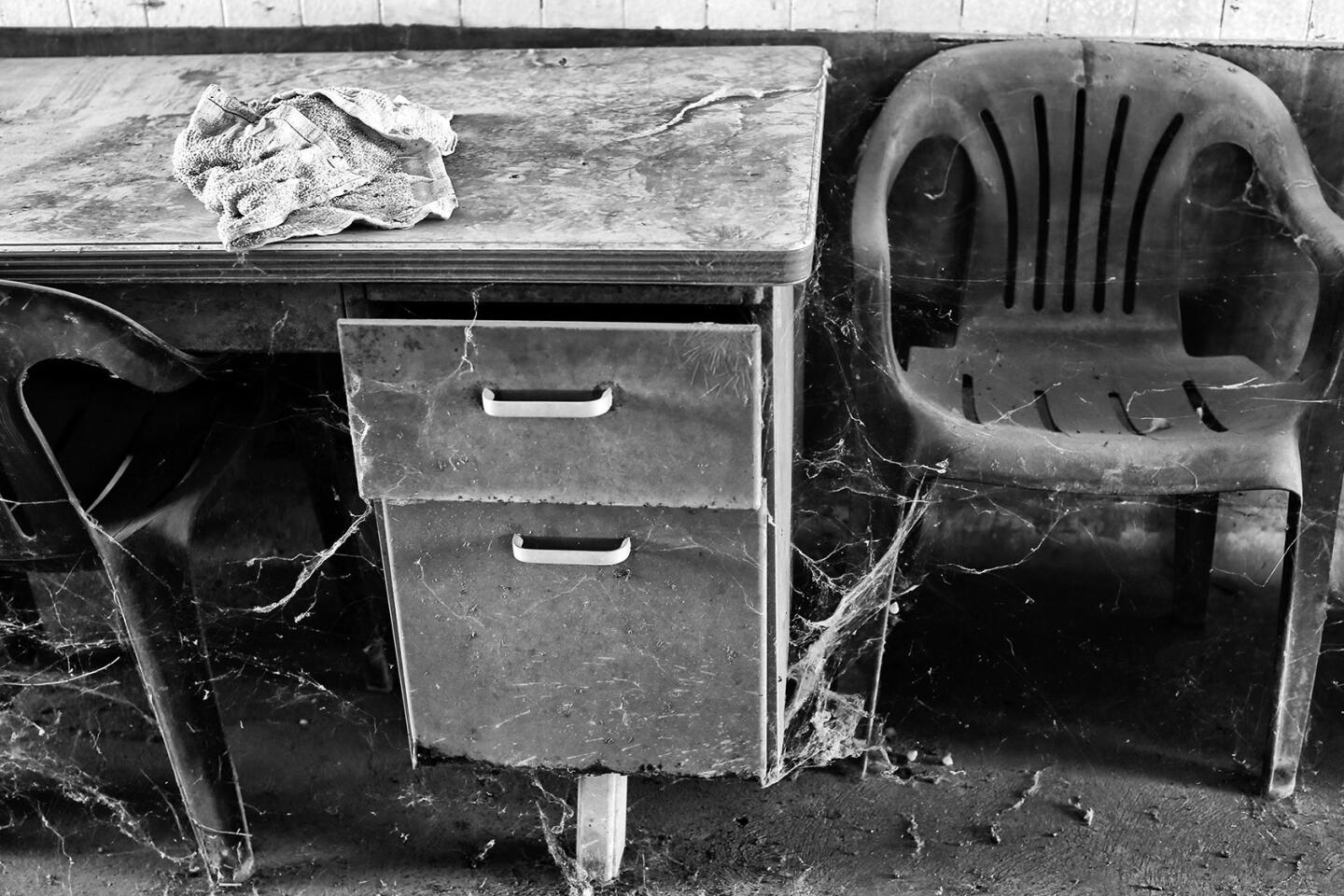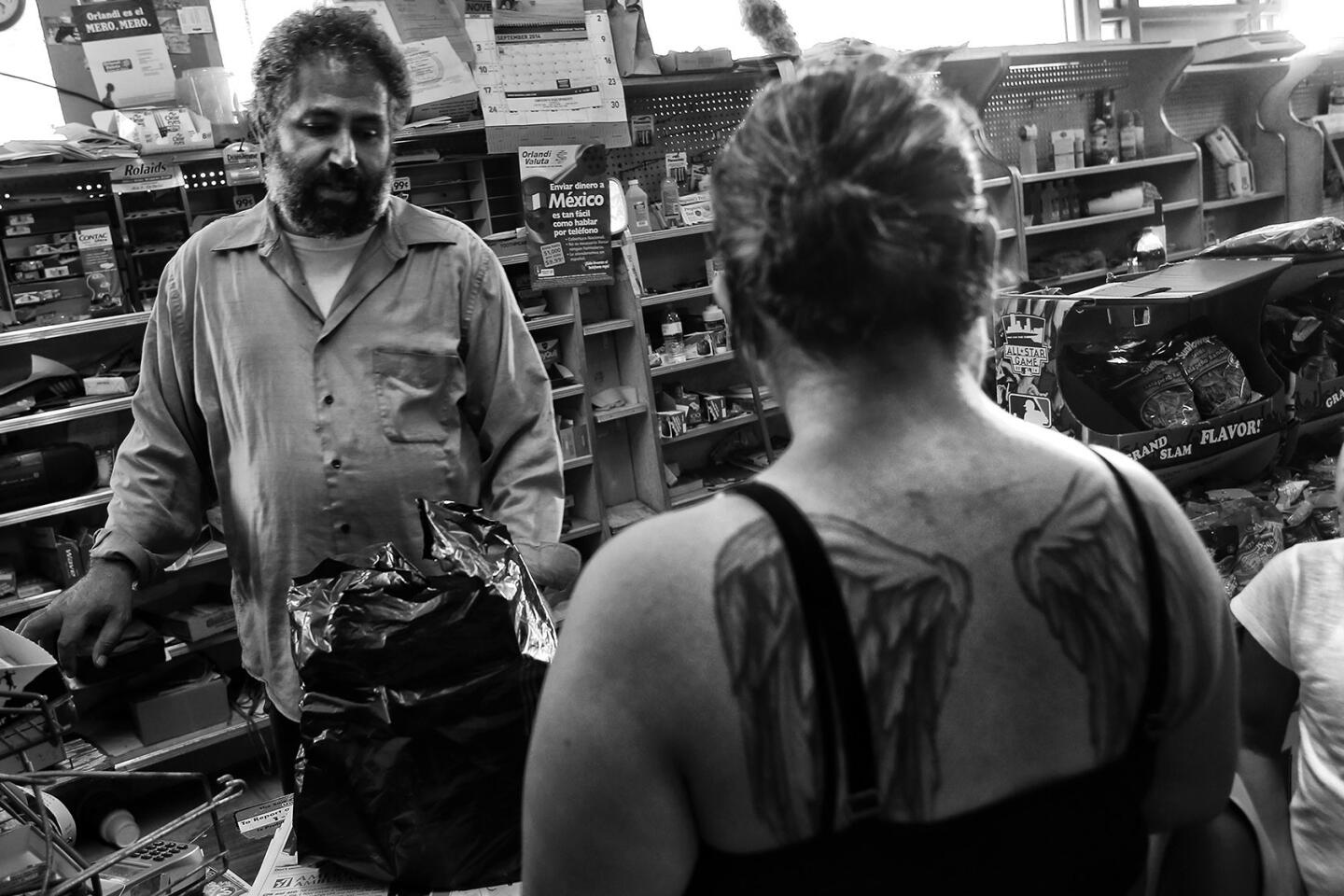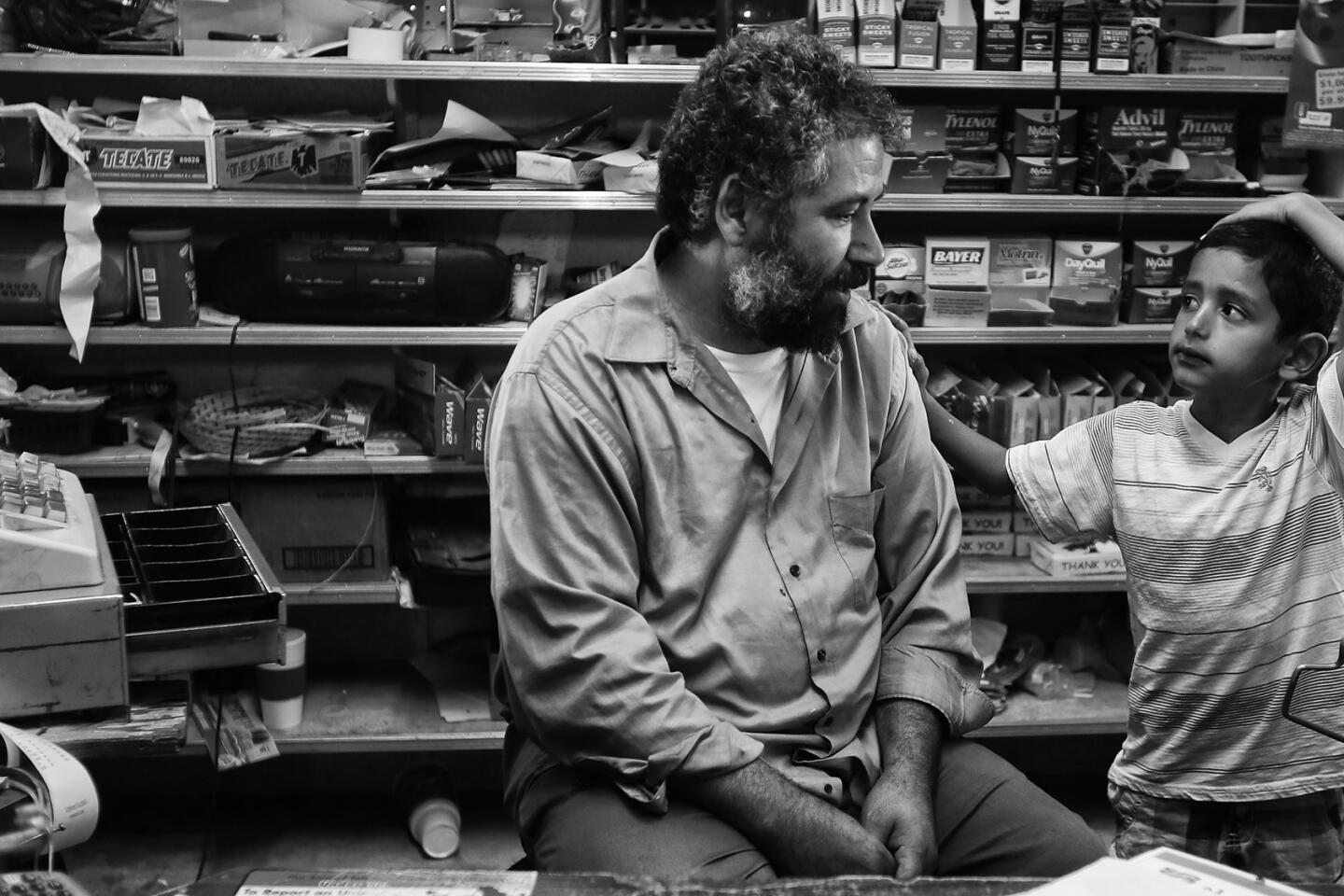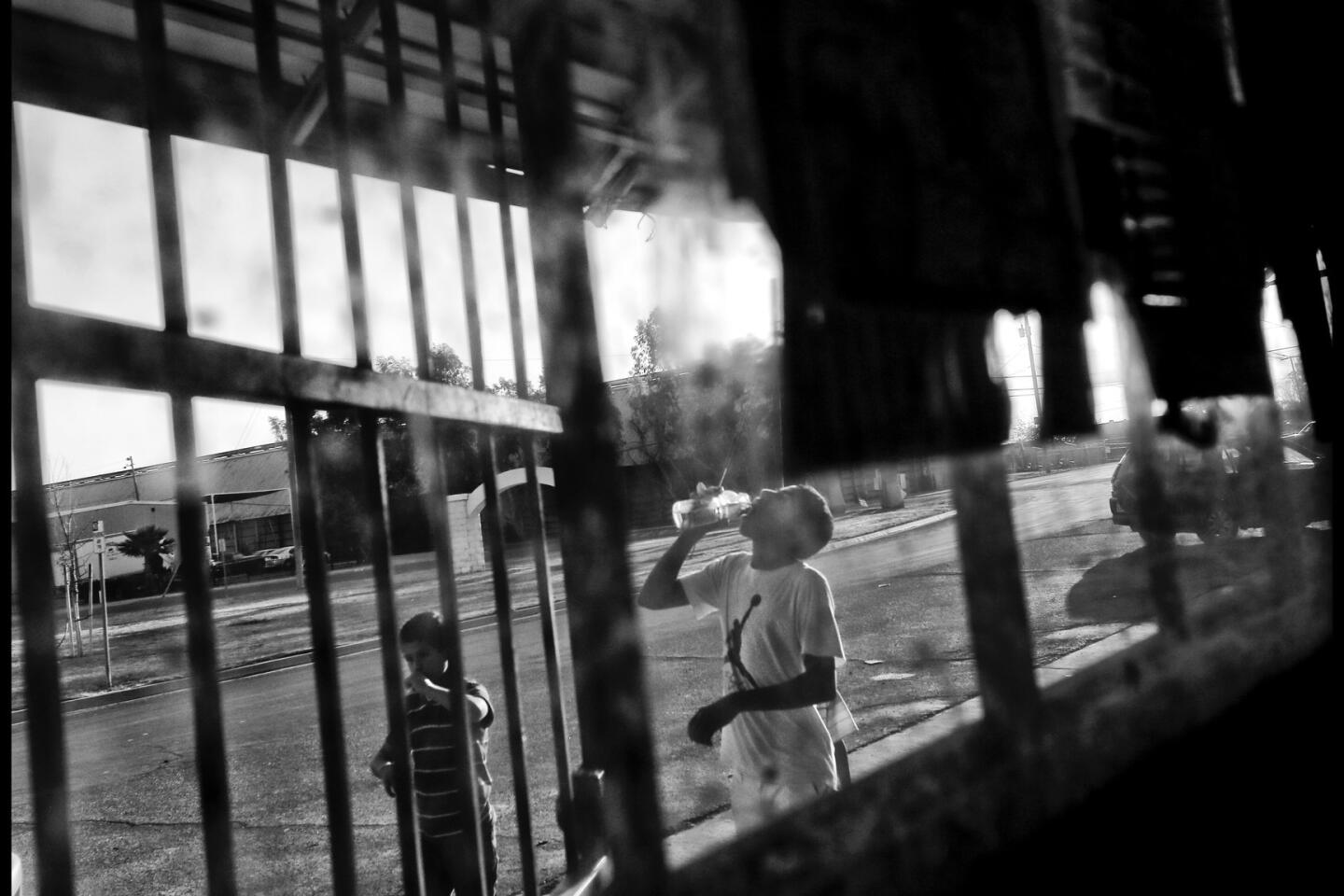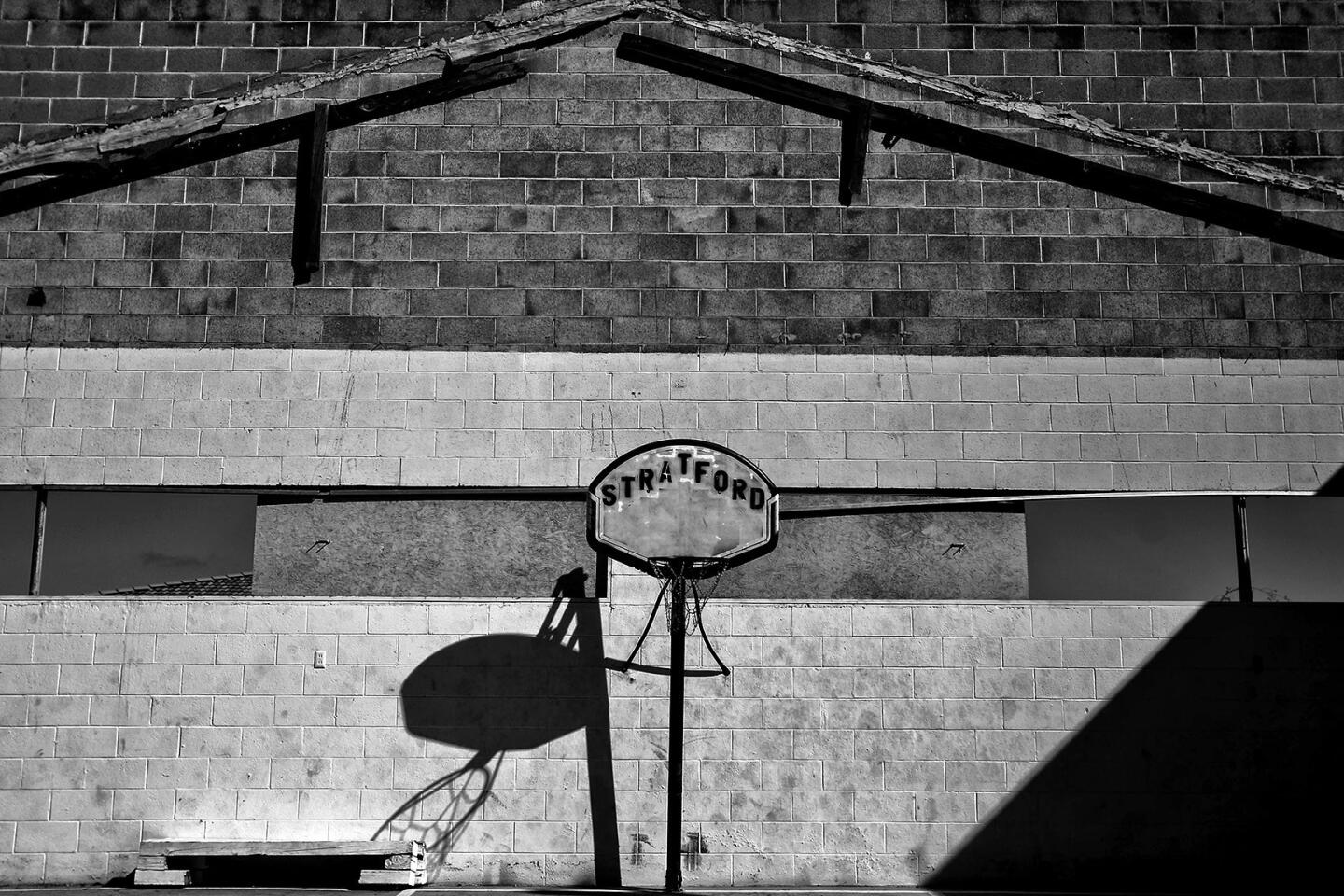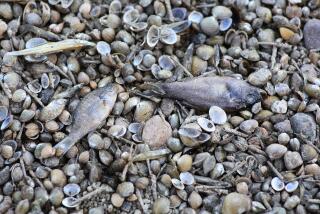Great Read: A parched farm town is sinking, and so are its residents’ hearts
Reporting from STRATFORD, Calif. — Beneath this small farm town at the end of what’s left of the Kings River, the ground is sinking.
Going into the fourth year of drought, farmers have pumped so much water that the water table below Stratford fell 100 feet in two years. Land in some spots in the Central Valley has dropped a foot a year.
In July, the town well cracked in three places. Household pipes spit black mud, then pale yellow water. After that, taps were dry for two weeks while the water district patched the steel well casing.
In September, the children of migrant farmworkers who usually come back to Stratford School a few weeks late, after the grape harvest, never came back at all.
By October, there were new faces in the drought relief line in front of the school, picking up boxes of applesauce, canned tomatoes, peanut butter, rice.
If rain doesn’t come soon to California, cities and suburbs will survive, with maybe fewer flower beds or more expensive lettuce.
But in Stratford — where the school has had some of the same teachers for 40 years, the auto parts store doubles as a coffeehouse and first names change but last names don’t — survival isn’t a given.
Even above ground, the town is sinking.
::
Arches at both ends of the town square spell out S-T-R-A-T-F-O-R-D in the shape of a rainbow. Years ago there was a population sign, but people argue over the last number it gave. There are about 900 people left now.
The glory days, when the arches were entrances to burger joints and gas stations for Central Valley residents driving to Pismo Beach, faded decades before the drought.
“But nothing like this,” said Josh Orton, manager of the farm equipment store his great-great-grandfather started in 1906. “There’s just no water.”
Two doors down at Hardin’s Grocery, the inventory has evaporated to a puddle of chips, drinks, tobacco and pregnancy tests near the cash register.
Customers push open the door to the dim store and its empty shelves, hollering “Hey ya, Kenny, or “Hola, Kenny” over the door chimes.
“Oye, Carnal” — “hey, dude” — the Yemeni store owner with tired eyes answers in Spanish slang.
His name is Mahmod Alrihimi, but they’ve been calling him Kenny for 24 years, ever since he leased the business from Mr. Hardin, who still lives in a trailer behind the grocery. (“I don’t know why ‘Kenny.’ Maybe it is easier for them to say?”)
Each day Alrihimi opens the store at 8 a.m. and closes at 10 p.m. If he’s really tired he’ll go home a half-hour early, but people invariably knock on his door and say, “Kenny, Can you come out? We just need a bottle of milk.”
He doesn’t mind. He likes feeling needed.
“I really love this town. I know so many families,” he said.
A man put two packages of hot dog buns and a roll of paper towels on the counter.
“Hey, Kenny, OK if I pay for these after Friday?” he asked, lowering his voice.
Alrihimi nodded. But his stomach dropped. This was a man who had never asked for credit before.
The store owner had 29 receipts that constituted the week’s IOUs. On the backs of two torn-up cigarette cartons, he wrote the running accounts: the ones where they owed $34, paid $12, then charged $8.
“It’s too sad to say no. I think of their kids,” said Alrihimi, a father of five.
“They don’t have any money. I don’t have any money. We’re all trying to get through little-by-little-bit.”
When he has to run errands, Darlene Lacey watches the store for him. She’s been helping out since her husband died 13 years ago.
Alrihimi worries about her.
“I think that when people can’t pay, she takes money out of her own pocket and puts it in the cash register,” he said. “She is a very good-heart lady. But she has too little money.”
Later that afternoon, when Alrihimi was at the bank, Lacey rang up two sodas for an elderly couple who asked for credit. Then she slipped $2 in the cash register.
“Kenny is hanging on by a thread,” she said. “And, oh my gosh, our little town needs him.”
::
Next door at the post office, a wall of boxes have “closed” stickers over them. They belong to families who’ve moved or haven’t paid their bills.
The lone employee, Rick Kimball, is bending the rules and keeping mail for those still in town. (“They’re working their tails off to get by. Seems like the least I can do.”)
He likes learning about people by paying attention to their mail.
“The Hamiltons? Nice folks. All the women’s first names start with “S” and all the men are named Tony,” he said.
Johnny Caldeira, 36, picked up a package, then leaned his elbows on the counter to chat.
“I’m beginning to feel like a bartender,” Kimball, a former parole officer and truck driver, told him.
“You’re the hangout spot now,” Caldeira said. “There aren’t any other places left.”
Caldeira went to Stratford School. Most of the classmates he graduated with in eighth grade are still in town.
“Adrian teaches fourth grade, Danny’s in the reserves. The Meyers — George and Charlie — farm,” Caldeira said. “They just lost their grandfather, old man Meyers. I think he was 100. We just lost Mr. Henry.”
His former seventh-grade teacher, William Henry, persuaded Caldeira to go to college after he returned from the war in Iraq. This month the graduate takes the test for his credentials. He wants to teach in Stratford like the man who pushed him.
“Mr. Henry used to be in the Navy before he was a teacher, so when I came back, I could actually talk to him. He had seen things too.
“At first it was, ‘How you doing? When you going back to school?’ Then one day he comes in, slams down a college application and says, ‘Now get your ass in school before I kick it.’ That’s a cleaned-up version. Mr. Henry had a mouth.”
::
Each spring, the seventh- and eighth-graders still dance around a maypole, and there’s always a festa at the Portuguese Hall.
But it’s the Constitution Day Parade that is really something to behold, said David Orton, Josh’s father.
The Navy base in Lemoore usually sends over a jet to loop around the arches. The ROTC kids from the high school the next town over march. A couple of farmers pull kindergartners on flatbed trucks. The Ortons add a tractor and Stratford School Principal Bill Bilbo rides his motorcycle — a crowd favorite.
“There are so many people in the parade that it leaves about 20 people watching,” Orton said, shaking with laughter. “And the next year, we do it again. This town has a way of holding on.”
The Orton family first came to farm in Stratford in the 1800s, when they got pushed off their Lemoore land by railroad barons.
Back then, their farm was on the edge of Tulare Lake — “the lake that once was.” It had been the largest body of fresh water west of the Mississippi, some four and a half times bigger than Lake Tahoe. But the four Sierra rivers that flowed to the lake — the Kings, Kern, Kaweah and Tule — were dammed, diverting water that powerful landowners could own and sell. The crops for some 50 miles around Stratford grow on what would have been the bottom of a lake.
The tule fog that rises from the ground and blankets the Central Valley in a blinding thickness each winter is said to be a Yokut Indian curse that the stolen waters shall haunt this place forever.
The drought is affecting even eternal curses. There seems to be less fog each year. Farmers fear it could hurt the moisture-loving, high-value nut crops that are quickly replacing fields of alfalfa, tomatoes and cotton.
At the Ortons, they still grow row crops, but they planted only 18 of their 100 acres. Now two wells are out and they don’t have water for what they planted.
“We’re growing dirt,” David Orton said. “It’s a very popular crop around here right now.”
::
On a Wednesday morning when the sky was still dawn-pink, Allyson Lemons and JD, her husband of 62 years, walked to the auto parts store. She carried a plate of fresh-baked chocolate chip cookies.
With all the town’s cafes long gone, Chris Rodriques always puts on a pot of coffee at his family’s store. On Wednesdays, Allyson and JD bring cookies. Last week it was her cornflake recipe.
The couple took their place at a long table with floral-patterned dinette chairs, where a group of neighbors had already settled in.
A couple of farmers read the Wall Street Journal. Dick Newton, 67, stretched out long legs while he checked college football scores in the local paper. Newton is one of the old families by dint of his mother’s side, who settled in the area in 1905. His father’s family didn’t come till 1911.
They got to chatting about that time when Newton and his brother were water-skiing on the Kings River — there was water in it then — and from the far bank, Newton’s brother shot an arrow at one of the Lemons’ chickens. The arrow went right through the bird’s neck and carried it to the front porch.
“You remember that?” Newton asked.
“Oh, do I,” said Allyson Lemons. “I heard something. Came to the door. And it landed right at my feet. I cooked it up for dinner.”
The Newton brother who shot the chicken is now farming marijuana on Orcas Island in Washington state, where the crop is legal.
Newton had a text from a farmer who said that 70% of his crop of pistachios were blanks — no nuts inside.
No one knew the reason for sure, but when the snows don’t come and rain doesn’t fall and even the fog thins, things go wrong.
On the other side of the square, Alrihimi opened for the day.
Three years ago he’d had a deli in back, with lines of field workers out the door twice a day. Now, he owed “so, so much money,” he said.
The other week, a farmer had put a hand on his shoulder and said, “Kenny, when the rain comes, the money comes.”
“I pray every day the water is coming back,” he said. “I don’t want to leave here.”
He sat on a milk crate in the doorway of the store. Lacey pulled out a crate and joined him in the sunshine of another cloudless day.
Twitter: @dianamarcum
More to Read
Sign up for Essential California
The most important California stories and recommendations in your inbox every morning.
You may occasionally receive promotional content from the Los Angeles Times.
